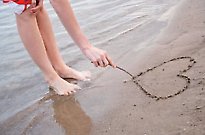
How to deal with anxiety in 10 steps

Naturopath Kylie Cloney lends some expert advice
Most of us perform well under pressure, and stress can in fact be a driving factor to push us forward in life. However, how far is too far before stress becomes anxiety and the line is crossed?
STEPS TO HELP YOU COPE
1. Foot off the accelerator and enter the slow lane
Switching off the fight/flight response of your body is a key to managing anxiety. This can be achieved by learning to relax and breathe. Slowing the body and mind may help to stop the chemical cascade in the body, which trigger anxiety symptoms.
2. Check your rhythm
Regular meals help to feed your body and brain and reduce sugar fluctuations, which are associated with many symptoms of anxiety. Early to bed gives the body a chance to rest and calms the nervous system. Creating a rhythm helps the nervous system to calm and assures the body that things are harmonious and safe.
3. Check for other underlying disorders
Anxiety symptoms can mimic or overlap many symptoms associated with other physical problems in the body. Have your health specialist check your hormones, iron, thyroid and blood sugar levels to see if this might be a cause of your anxiety.
4. Talk it out
Anxiety is not something to be quiet about. The more you talk openly, the more you realise that many people have at some point in their life experience periods of anxiety. Sourcing a counsellor or health professional that your feel comfortable with can provide reassurance and tools to refocus your thoughts and energy.
5. Seek the professional help of your doctor and a qualified naturopath
If you’re feeling like you're swimming in the deep end, call out for help. Consult with your family doctor as well as your naturopath to discuss the options you have for pharmaceutical or nutritional/herbal support. Orthodox medicine may offer anti-anxiety and anti-depressant drugs as well as counselling sessions. Naturopaths can help to provide natural herbal and nutritional treatment for both anxiety symptoms and underlying physical imbalances. Herbs such as kava, passionflower and amino acid therapy are highly effective for anxiety support.
6. Get moving
Get your groove on the dance floor or hit the gym; just get that body moving. Research continues to show that exercise is an effective way to increase those happy brain hormones and reduces symptoms of anxiety.
7. Check your pipes – bowel health
Did you know that if your plumbing is in poor condition, you may increase your risk of developing an anxiety disorder? There is a delicate gut/brain relationship and the guts of the matter is that if you can’t absorb your nutrients, your brain ends up starving and you end up as a worrywart due to a chemical hormone deficiency. Eat plenty of fibre, use probiotics after illness and stay regular with your bowel.
8. Meditation and energy healing
A session of yoga or a facilitated session with an energy healer like a Reiki practitioner may help you to access a calm and meditative state which can be a challenge on its own.
9. Cut out caffeine
Coffee smells and tastes so good, but to the anxiety sufferer, a small amount of caffeine can trigger off heart palpitations and panic because of the stimulating effect it has on adrenal glands. Opt for caffeine-free drinks such as herbal teas or try organic chemical free decaffeinated coffee instead.
10. Rewire your thoughts toward happiness
Thinking happy thoughts actually works, write down daily a list of things you’re grateful for, and list the things you love, including your strong points. Catch yourself when you are thinking negative thoughts and see if you can change them into something positive. Think of it as re-programming your computer (brain) to a ‘happiness’ operating software version.
Next: What exactly is anxiety?
18 instant stress busters>>
How to get a good night's sleep>>
Photo credit: Thinkstock


